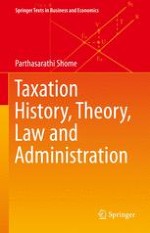2021 | OriginalPaper | Buchkapitel
12. Tax Assignment and Revenue Sharing
verfasst von : Parthasarathi Shome
Erschienen in: Taxation History, Theory, Law and Administration
Verlag: Springer International Publishing
Aktivieren Sie unsere intelligente Suche, um passende Fachinhalte oder Patente zu finden.
Wählen Sie Textabschnitte aus um mit Künstlicher Intelligenz passenden Patente zu finden. powered by
Markieren Sie Textabschnitte, um KI-gestützt weitere passende Inhalte zu finden. powered by
